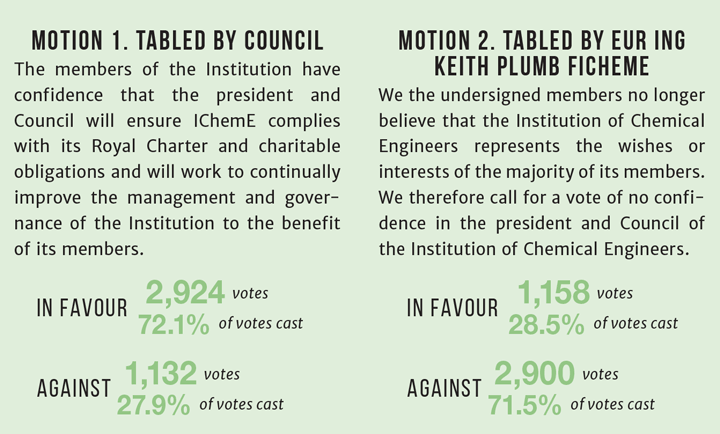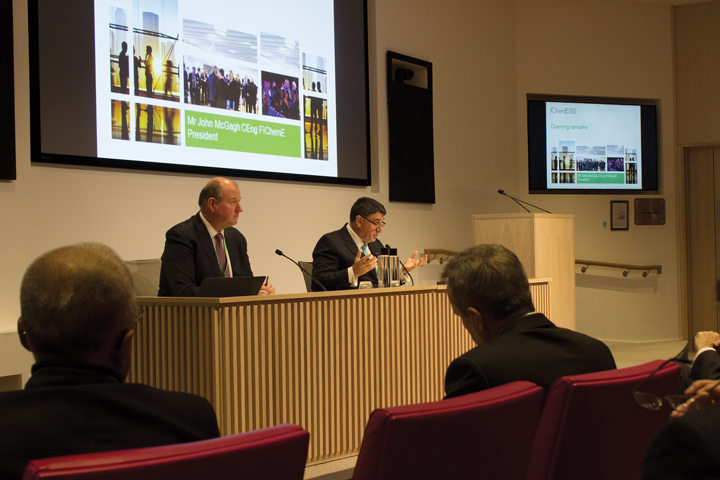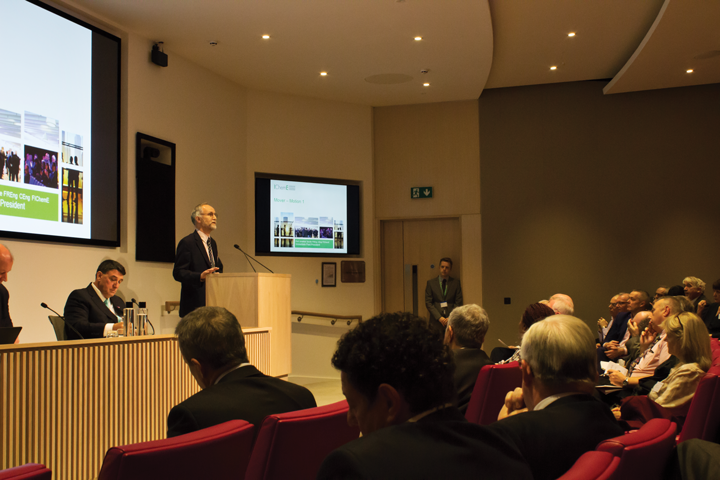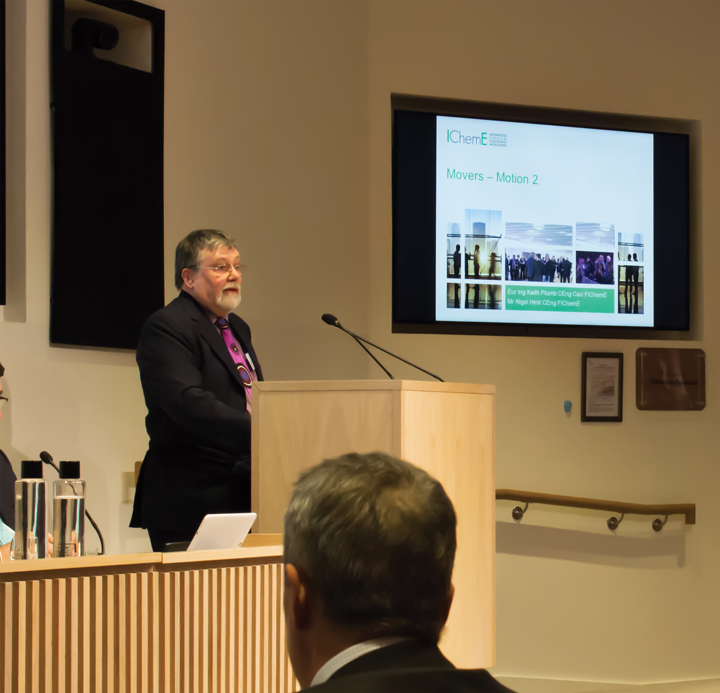EGM vote supports evolutionary change at IChemE
Attention now turns to addressing member concerns
ICHEME’s membership has supported the current leadership to deliver evolutionary change at an extraordinary general meeting (EGM) held in London on 11 January.
IChemE members, representing 31.1% of voting membership, voted on two motions – the first in support of IChemE’s Council (see Motion 1, opposite) and a second, calling for a vote of no confidence (Motion 2).
The motion of support received 2,924 votes in favour (72.1% of votes cast), with 1,132 votes against (27.9%). While the motion of no confidence was rejected, with 2,900 votes against (71.5%) and 1,158 votes in support (28.5%).

Unprecedented turnout
Commenting on the result, IChemE deputy president Ken Rivers said: “The turnout of 31% is unprecedented for our Institution. This is an important step towards the higher level of membership involvement we all want to see in IChemE affairs.”
There has been a long-running online debate concerning IChemE’s management. This culminated in October with a request from IChemE Fellow Keith Plumb, along with 49 supporting signatures, for a vote of no confidence in the trustees of the Institution. A forceful campaign followed ahead of the EGM with comments from some of the signatories described by IChemE as ranging from “sensible” to “outrageous”.
False claims included that IChemE is technically bankrupt, sold its London property under market value in the early 2000s to fulfil its pension liabilities, and pays its senior staff over-inflated wages. IChemE has published online a Fact Checker to refute such claims:
www.icheme.org/about_us/fact-checker
“New governance proposals will bring greater transparency, enhance member representation, and improve accountability.”

Governance proposals
However, among these claims are peppered legitimate concerns, including that there is a lack of transparency in the governance of IChemE and the election of its Council. Speaking at the EGM in favour of Motion 2, IChemE Fellow Nigel Hirst said: “Our desire is to have a democratically-elected Council commanding wide support.”
IChemE has accepted that there is a “democratic deficit” and points to the work initiated two years ago that has seen members consulted on how to revise its governance. Some key decisions on governance were published in December 2016, while wider proposals are set to be presented at IChemE’s AGM in May.
Writing in The Chemical Engineer last issue, IChemE CEO Jon Prichard said: “New governance proposals will bring greater transparency, enhance member representation, and improve accountability.”
Among the other concerns voiced by supporters of Motion 2 during an open session at the EGM were that IChemE has become disengaged from the public by closing its media outreach programmes and has curtailed entrepreneurialism among special interest groups (SIGs) and member groups by implementing heavy-handed financial constraints.
“We need to re-engage in such a way that the SIGs and member groups are entrepreneurial and can generate the money for charitable reasons like we used to do,” Plumb said. “We need to reengage with the public – let’s not forget that chemical engineering underpins civilisation.”
Attention now turns to addressing the concerns put forth by the members who voted no confidence in Council.
“Our desire is to have a democratically-elected Council commanding wide support.”

We are listening
Rivers, who is set to succeed current president John McGagh in May, said: “I am gratified that so many members restated their confidence in Council and for the programme of change we are developing. But we want to reach out to those who have not been content and who have voted against Council, whatever their individual reasons for doing so.
“To you I want to say that we are listening, we have heard many of your concerns, and we want to understand your views better.”
Speaking to The Chemical Engineer following the EGM, Rivers said he recognises concerns raised by supporters of Motion 2 at the meeting.
“Do I think we are member led enough? No. Do I think we support members well enough? No. Do I think that we serve society well enough? No. We could do better. So, all of that agenda – I agree with.”
“And I want to do that in a constructive and engaging way rather than in a destructive confrontational way. That’s my way of doing things and I hope that resonates.”
With all that in mind, he requests that members give the trustees time to act.
“Never ever judge me by what I say. I will take full accountability for what I do. The bit I ask you for though, is just give me a little time to get things done…In the meantime, would you just get behind me a little bit to try and make that happen. If I fail to do it give me a good kick and get rid of me. But judge me by what I do.”
“To you I want to say that we are listening, we have heard many of your concerns, and we want to understand your views better.”

Engagement online
A number of members at the meeting spoke about their concerns that the online debate in the leadup to the motion proposal and the resulting EGM had been unproductive and at times unprofessional. More than one member commented that “we shouldn’t be airing our dirty linen in public”.
On the other hand, some supported the use of online forums – reasoning that without them there would have been no place for members to come together and put pressure on IChemE to address their concerns.
Rivers said he wanted a safe forum where members can discuss member issues outside of the public glare but that still allows individuals to be frank with one another.
“The EGM has provided a focus and an energy. I want to keep hold of that energy to actually get more members involved to channel it in the right direction,” Rivers said.
“The EGM has provided a focus and an energy. I want to keep hold of that energy”
What next?
While the EGM delivered a vote of confidence, it is fair to note that a significant minority voted that they are dissatisfied with Council. IChemE CEO Jon Prichard sat down with The Chemical Engineer to discuss what happens next, including plans to address the legitimate concerns raised by those who proposed and supported Motion 2.
Prichard began by explaining that IChemE has two key functions: to act as a qualifying body and act as a learned society.
“If I look at the qualification function, I think we’ve got a tremendous track record of delivering high-quality chartered chemical engineer assessment.”
However, there is room for improvement, he says.
“I do question whether we have the right scalable processes. If you look at the way we currently qualify people, we require a lot of volunteer input…far more than any other engineering institution.”
“Do not change the standards, do not change the outcomes – but [we must] look at the processes from an efficiency perspective.”
A stronger voice
The second function, IChemE’s learned society activity, is described by Prichard as working like a member-led, knowledge feedback loop. Members choose policy positions on grand challenges, which in turn informs and drives member activity that results in publications, conferences and courses that disseminate the knowledge to the community and for wider social benefit. This in turn feeds back into the policy activity forming a virtuous circle.
However, Prichard says the current ‘member voice’ that informs this activity is “weak”.
“At the moment I don’t have a mechanism for signing off [a policy position] other than through a VP technical or an individual. It’s got to get beyond the individual. It’s got to be member-led in every sense of the word. It’s a peer review decision.”
Prichard says IChemE needs to create a dedicated committee that would help strengthen member voice on IChemE’s learned society activity by forming a conduit between members and Council through the newly-proposed Congress. The Congress itself will be formed if the governance review is passed at the AGM in May. The Congress would act as an elected forum of members to take issues to Council and hold them to account, and act as a bridge to the membership in general to stimulate their involvement and enablement.
Learned Society Committee
Meanwhile, Prichard’s proposed Learned Society Committee would suggest areas of activity and engage in the decision-
making process for how resources are allocated for learned society activity.
“I think we must have a Learned Society Committee to steer our learned society activity.”
Asked who would sit on this committee, Prichard said: “I haven’t yet produced a plan as to how you populate it. Do you cut it regionally? Do you cut it by area of practice? I need more conversation with the SIGs, with the member groups, and the Safety and Energy Centres to understand how they would like to make this work.”
He said he will engage directly with these groups in the run up to the AGM to discuss how to make the new committee work. If members have views to share on this topic, he said they should direct them through either their member or special interest group.
Convincing the Committee to say yes
A concern that was repeatedly raised by proponents and supporters of Motion 2 was that financial constraints have strangled entrepreneurial activity among member groups and special interest groups. Prichard has sympathy for this concern and sees the Learned Society Committee helping to turn the situation around.
“As long as we comply with our legal requirements then I’d like to see the innovation there,” he said. “We need to migrate from where we are to a position where if you have a good idea, and you can persuade your peers in the Learned Society Committee that it’s a good idea then they hold the central pot that allows the investment to take place. So, it doesn’t become the staff in Rugby saying “no”. It becomes if you didn’t convince your peers that this was a good idea…go back and rework the case until its convincing.”
“we want people to stand on a manifesto. I’d love to see people standing on a manifesto that says: ‘I’m really interested in improving the learned society’”
So, the formation of Congress and the Learned Society Committee should help address member concerns about: support for member groups and special interest groups in terms of staffing resource and the financing of learned society activity; Council elections and Council activity being more open and transparent; and engaging directly with Council to shape and prioritise activity.
On top of this, Prichard revealed that in response to criticism over the election of members to Council, the trustees have decided against nominating candidates.
“Council doesn’t want to nominate any Council members for election this year, because that’s been part of the problem. So, we want people to stand on a manifesto. I’d love to see people standing on a manifesto that says: ‘I’m really interested in improving the learned society’.”
UK support
Another repeated criticism has been that UK members feel the rapid internationalisation of the organisation has resulted in a loss of financial and staffing support for UK members and their activities.
Prichard says IChemE is in the process of recruiting a UK country manager that should help rebalance this loss of support.
“I anticipate that post being populated by a Chartered Chemical Engineer, and that person will be key to understanding the two components: the qualifications function and therefore the relationship with employers…but also the future knowledge needs. I need to firm up the job description and get the advert out.”
Finally, how does Prichard see IChemE re-engaging and providing confidence for those 1,000+ members who voted against Council?
“Council is already making efforts to reach out – and I think that is important.”
“There are some people who are unhappy with the way the Institution ran the campaign – and we can have a discussion around the rights and wrongs of that but actually I think we need to move forward and draw a line under this.
“Do you want to help us build a better future? If the answer is yes, let’s be constructive about it and let’s deliver that.”
He explains that there is currently a working mechanism for governance but IChemE has not been using it well.
“So, let’s use the mechanisms that exist to deliver transformation and change. Whichever side you’re on – generally you’re interested in doing things better, and I think if you speak to both sides, they both want to do
things better.”
Prichard concludes by explaining that many of the concerns that have been raised by members were identified in the plans he first submitted when he took up the role of CEO in 2017.
“If you look at the plans that I put before Council: valuing the volunteer: that was in there; reshaping the learned society so that it adds value was in there; delivering efficiency in the
qualifications programme – that’s in the plan.”
While he admits frustration that the EGM has delayed the roll-out of these measures he strikes a conciliatory note, saying it is important that Council and IChemE staff demonstrate that they have heard the legitimate concerns that members have raised, and notes if he had his time over again, he would have sought to explain his plans earlier.
“Could we have communicated better last year? If I’d known how frustrated people were, in my first month then I would have started a different and more direct communication campaign.”
IChemE is now exploring options for setting up an extranet site for IChemE members to discuss key matters that relate to the future of the Institution. “We want to hear from the many members who did not vote, or who voted for EGM Motion 2. The easiest way to do this is to get involved locally.”
Member-led mantra
Returning to the proposed changes, Prichard says: “I think the message here is this is all doable. There’s a great institution sitting here with a long history and a long heritage of doing good things. What I’ve come in to do is to ensure it continues to do good things. So any help I can get from the members to move to that position whereby we ensure that all decisions are member led, means we ensure that we support them and we ensure we are serving society. As long as we follow that mantra, we will succeed.”
Recent Editions
Catch up on the latest news, views and jobs from The Chemical Engineer. Below are the four latest issues. View a wider selection of the archive from within the Magazine section of this site.




